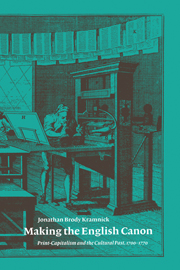Book contents
- Frontmatter
- Contents
- Acknowledgments
- Introduction: the modernity of the past
- Part One
- Part Two
- Chapter 3 Novel to lyric: Shakespeare in the field of culture, 1752–1754
- Chapter 4 The cultural logic of late feudalism: or, Spenser and the romance of scholarship, 1754–1762
- Part Three
- Afterword: the present crisis
- Notes
- Index
Chapter 4 - The cultural logic of late feudalism: or, Spenser and the romance of scholarship, 1754–1762
Published online by Cambridge University Press: 22 September 2009
- Frontmatter
- Contents
- Acknowledgments
- Introduction: the modernity of the past
- Part One
- Part Two
- Chapter 3 Novel to lyric: Shakespeare in the field of culture, 1752–1754
- Chapter 4 The cultural logic of late feudalism: or, Spenser and the romance of scholarship, 1754–1762
- Part Three
- Afterword: the present crisis
- Notes
- Index
Summary
In this chapter I discuss the critical formation that gave rise to the first fully canonical Spenser. Whereas Shakespeare was treated more or less continuously from the Restoration onward (although as I have attempted to show in shifting terms), Spenser was self-consciously revived during the 1750s and 60s. When Spenserians from this period began their projects they frequently invoked the lamentable forgetting of their poet, his ill-fitting in modern times. This maneuver entailed a varied reconsideration of language (archaism), genre (the romance), and history (feudalism), and was characteristically used to elevate Spenser. The majority's refusal or inability to read The Faerie Queene signified the poem's valuable distance from modern culture. The revival of Spenser has a relatively concrete register in the number and style of editions as well. After the 1679 two volume quarto edition of Edmund Spenser: The Works of that Famous English Poet, the first to contain the poet's “life,” John Hughes's four volume duodecimo Works of Spenser (1715) remained the sole eighteenth-century edition of Spenser's poetry until Frank Birch's Faerie Queene in 1751. During the years that saw an intense debate over Shakespeare's status, Spenser remained relatively in the wings of critical culture.
- Type
- Chapter
- Information
- Making the English CanonPrint-Capitalism and the Cultural Past, 1700–1770, pp. 137 - 190Publisher: Cambridge University PressPrint publication year: 1999



